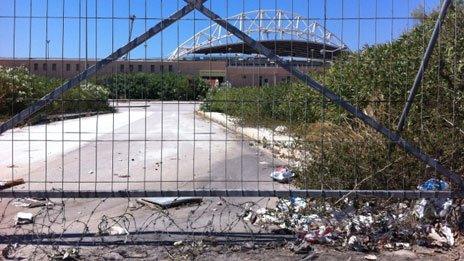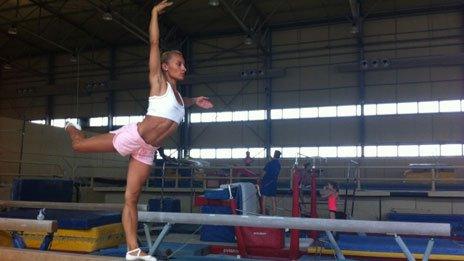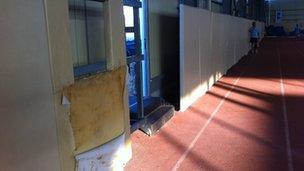Greek athletes strive for London as Athens legacy fades
- Published

Venues which gleamed in 2004 have been left to rot
Even in the late afternoon, the heat is unbearable. The athletes put on a brave face, but it is hard to stand still, let alone sprint across hurdles.
There is no longer the money to fix the air-conditioning inside the main track-and-field training facility in Athens. So Greece's Olympic stars are left to swelter.
The crash mats are torn - the stuffing bursting out - and the cushions on the equipment are fraying. The facilities have crumbled - all in the space of eight years.
For in 2004, Greece gleamed on the international stage as host of the summer Olympics, its athletes soaring.
But today, the country is choked by the worst financial crisis in its modern history - and sport, too, has been hit hard.
Greece is sending its <link> <caption>smallest Olympic team</caption> <url href="http://www.bbc.co.uk/sport/olympics/2012/countries/greece" platform="highweb"/> </link> to London for 20 years. State funding for the individual sports federations has been slashed and athletes lack the very basics.

Vassiliki Miloussi goes through her paces as she trains for London
In the gymnastics hall next door, Vassiliki Miloussi is preparing for her second Olympics.
"We don't have the money to pay for medicines, doctors or physiotherapists", she says.
"We can't invest in training facilities or afford to train abroad. The federation tries its hardest, but everything is difficult now."
Also practising is a group of young gymnasts - the next generation of Greece's Olympic hopefuls.
As the session ends, the coach, Anastasia Dondy, prepares to drive them home. "Their parents can't afford the petrol to pick them up from here anymore", she says.
Outside lie many of the venues from the Athens games, others dotted around the city. Most are idle, locked up and empty, simply rusting under a baking summer sun.
They mirror the decay now felt across the country - but also stand as monuments to Greece's mistakes: the massive overspend of the past, without any plan for later use.

Attempts to sell the former Olympic buildings have failed
They're seen as representative of the short-term vision that got Greece into its financial mess in the first place. The hoped-for privatisation of many of the sites has been thwarted by a mix of bureaucracy and mismanagement.
"We have these facilities. What do you suggest we do? We try to rent them and we cannot", says Spiro Pollalis, who heads the company charged with selling the largest Olympic area - the Hellinikon complex south of Athens, containing the old city airport and many of the sports venues.
He insists they should have been torn down immediately after the Games, leaving the six million square metre site free for private investors - although none has so far signed a cheque.
"These venues served their purpose but they were temporary."
But therein lies the problem, I suggest - that spending millions of euros for three weeks of sport before dismantling the buildings might not be the best use of money.
"I disagree", he says. "At the time we had to host the Olympics - and we did that very well. And before we blame Greece, we need to look at other Olympic facilities and how they deteriorated. In a few years, I would like to see what will happen in London."
Some estimates put the overall cost of the Athens Olympics at 10 billion euros.
They came at the height of Greece's borrowing boom: three years after the country joined the Euro, Athens was investing in grand infrastructure projects that it simply couldn't afford: among them, the Olympics.
"Yes there were mistakes and overspending from our part, but Athens was transformed into a modern city", says Spyros Capralos, the President of the Hellenic Olympic Committee.
"After the Games, we had a new airport, new roads, and public transport. Athens 2004 is an easy target of blame, but instead we should blame all the people who created the government deficit over the years."
So if he could turn back the clock, would he again have bid for the Olympics?
"Yes - the Olympic Games were something positive for Greece."
They may well have presented this country in a new and attractive light and provided an excuse for important upgrades to Athens.
But as the gloss of 2004 has worn off, reality has set in, the sporting legacy remains elusive and, for some, pride at hosting the Games has begun to fade.
"Maybe the reason why we don't have much money now is that we had the Olympic Games in 2004", says Stella Ledaki, a pole-vaulter dreaming of Olympic success.
"So I'm not sure if we had the economic stability to have the Olympics here; maybe we shouldn't have had them at all.
Greek athletes hope for great things in London - in spite of, rather than thanks to, conditions back home. This is the country where the ancient and modern Olympics were born.
But the recession spares little, and now Greece is left to wonder how much further there is to fall.